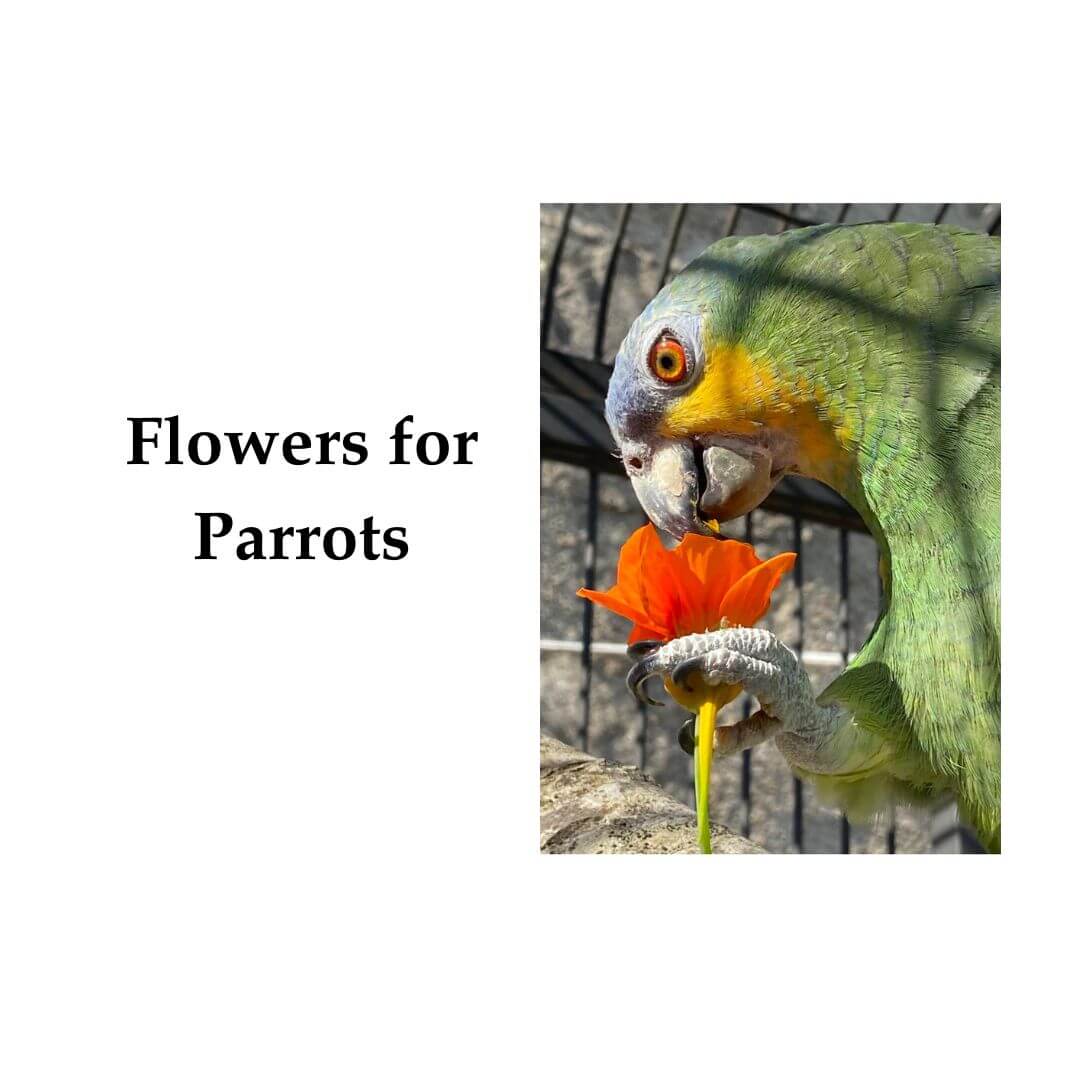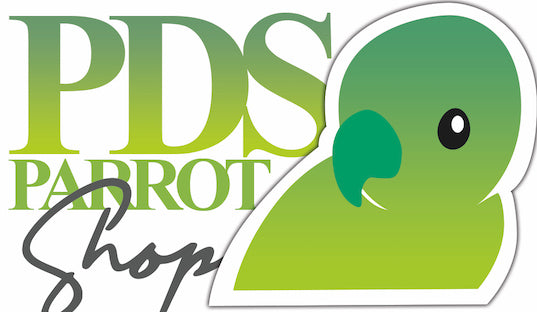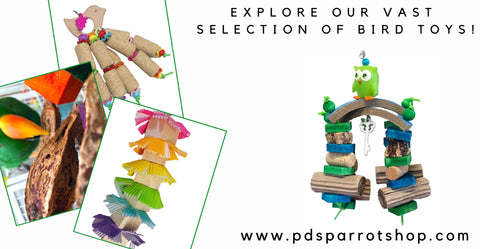
Flowers for Parrots: A Flavorful Journey with Health Benefits
Share
Introduction To Flowers for Parrots
Parrots, with their colorful plumage and enchanting personalities, make fantastic companions. To ensure they lead a happy and healthy life, it's crucial to provide them with a balanced diet. One way to do this is by incorporating flowers into their meals. In this guide, we'll explore the world of "flowers for parrots" and understand how they can benefit your parrot.

Pin Me!
Important Information Before We Start
It's important to note that while flowers offers potential health benefits, it should be used sparingly and in diversity, as part of a balanced diet. As I share in The Science of Avian Nutrition, incorporating edible flowers can make your parrot’s meals visually stimulating and nutritionally complete.
Understanding the Health Benefits of Flowers For Parrots
Flowers have been part of parrot diets for centuries, providing essential nutrients and vibrant flavors. These blooms offer a variety of benefits for your pet parrot. Here are some of the benefits flowers can provide:
1. Digestive Aid
Most flowers like daisy and lilac can aid in digestion for parrots. They stimulate the digestive system and may alleviate gastrointestinal discomfort.
2. Antioxidant Properties
Many flowers are rich in antioxidants, which can help combat free radicals in your parrot's body, promoting overall health.
3. Natural Immunity Boost
Flowers such as chamomile contain natural compounds that may enhance your parrot's immune system, helping them fend off illnesses.
4. Lowering Blood Sugar
Some flowers can help regulate and improve insulin function
5. Weight Management
These flowers contribute to a feeling of fullness, potentially reducing overeating, and aiding in weight management.
6. Heart Health:
Some flowers like borage helps heart health and reduce the risk of heart disease.
7. Anti-inflammatory:
Many flowers have properties that may be beneficial in managing conditions like arthritis and other inflammatory disorders.
8. Improves immunity:
Flowers may strengthen the immune system and help the body fight off infections.
9. Wound Healing:
Some flowers are believed to have antiseptic and wound-healing properties when applied topically.
10. Antibacterial and Antifungal Properties:
They may help combat certain infections when used in traditional remedies.
Why Give Your Parrot Flowers?
Feeding flowers to your parrot can be a delightful and enriching experience for both you and your feathered friend. Here are some reasons why giving your parrot flowers can be a rewarding practice:
1. Nutritional Benefits
While flowers may not be nutritional powerhouses like fruits and vegetables, they offer a spectrum of vitamins, antioxidants, and minerals. Incorporating them into your bird's diet can provide a unique range of nutrients, adding variety to their meals.
2. Vibrant Colors
Birds are naturally drawn to bright and colorful objects. Edible flowers, with their vivid hues, stimulate your bird's senses, making mealtime a visually engaging experience.
3. Mental Stimulation
Tearing into petals and exploring the textures of flowers can provide mental stimulation for your avian companion. This sensory engagement can help combat boredom and enhance their overall well-being.
4. Natural Foraging
In the wild, birds often forage for food. Introducing edible flowers into their environment can simulate this natural behavior, providing both mental and physical exercise.
Safe Edible Flowers for Your Bird
When considering introducing flowers into your bird's diet, it's crucial to choose the right blossoms. Not all flowers are safe for consumption. Here are some bird-friendly options with their specific health benefits: ( use fresh or dry)
Bee Balm: Bee balm is rich in antioxidants, helps with digestive discomfort, including gas, indigestion, and bloating, have antimicrobial properties and may help support the immune system, calming effects, and anti-inflammatory properties.
Borage Blossoms: Borage is a good source of essential nutrients, has anti-inflammatory properties, borage is a source of calcium and magnesium, which are essential for maintaining healthy bones, respiratory health, heart health, and rich in antioxidants.
Calendula: Contains compounds for anti-inflammatory properties, antiseptic, immune support, digestive health, has anti-fungal and anti-microbial properties,
Carnations: Helps digestive discomfort, reduce fever, or relieve stress and anxiety. anti-inflammatory and antioxidants properties.
Chamomile: Help reduce stress, anxiety, and promote relaxation. Helps with digestive health, anti-inflammatory aid, heals wounds, provides immune support, an rich in antioxidants
Chrysanthemum: have been valued for their potential health benefits which includes; anti-inflammatory properties, eye health, calming and soothing properties, liver health, rich in antioxidants, and digestive health.
Echinacea: recognized for its immune-boosting properties, but also rich in antioxidants, anti-inflammatory properties, wound healing, respiratory health, helps with pain, reduces stress, and helps with allergy relief.
Daises: have antiseptic properties that help prevent infection and promote natural wound healing, aid with digestive health, anti-inflammatory properties, and aid in respiratory health.
Dandelion: Dandelion greens are packed with essential nutrients, aid in liver and digestive health, has anti-inflammatory and antioxidants properties, control blood sugar, heals with urinary tract and respiratory health.
Elderberry: known for immune support, but also has anti-inflammatory and antioxidants properties, heart health, lower cholesterol levels, aid in respiratory and digestive health.
Gardenias: has anti-inflammatory, calming and soothing properties, and aid in digestion health.
Gladiolus: has anti-inflammatory and aid in digestion.
Hibiscus: helps lower blood pressure, antioxidant effects, liver and digestive health, lowering LDL cholesterol levels, aids in heart health, has anti-inflammatory effects, respiratory and urinary tract health.
Honeysuckle: Antioxidants help protect cells from oxidative stress and free radical damage, aids immune system, anti-inflammatory effects, respiratory and digestive health, has antimicrobial properties and has positive effect on heart health.
Impatiens: have antiseptic properties that help prevent infection and help healing, aids in digestive and urinary health, has anti-inflammatory properties.
Lilac: alleviate respiratory discomfort, promote digestive health, and antioxidants effects.
Magnolias: are anxiety and stress reducing, used for digestive health and has anti-inflammatory properties.
Marigolds: has been traditionally used to promote wound healing, alleviate digestive discomfort, has anti-inflammatory and antioxidant properties, and
promote eye health.
Nasturtium: has natural antimicrobial, anti-inflammatory, and antioxidants properties, supports the immune system, aids in wounding healing, and digestive health.
Pansies: contain compounds with anti-inflammatory properties and aids in respiratory and eye health.
Passion flowers: has anxiety-reducing and sedative effects, improves sleep, alleviate symptoms of mild to moderate depression, nervous system support, pain relief, aids in digestive and respiratory health, antioxidants effects and helps regulate blood pressure.
Roses/Rose Hips: stress reducing, alleviate digestive discomfort, muscle-relaxing properties, antioxidants effects, immune support and cardiovascular health.
Sunflowers: highly nutritious, aid in heart health, has antioxidant properties, aids in digestive and bone health.
Violets: relieve respiratory conditions, aids in digestive health, anti-inflammatory effects, diuretic effects, helps relieve pain and are nutrient rich.
Cautionary Notes
While edible flowers can be a delightful addition to your bird's diet, it's essential to exercise caution. Some flowers are toxic so always ensure they are safe to consume. Avoid flowers that have been exposed to pesticides or other chemicals. Additionally, ensure that the flowers are free from molds or fungi, which can be harmful to your avian companion.
Nuts are a tasty source of protein and enrichment for parrots—discover which ones are safe and beneficial in our full guide on Healthy Nuts for Birds.
Incorporating Flowers into Your Parrot's Diet
Now that we've explored some of the best flowers for parrots let's discuss how to include them in your bird's diet. It's crucial to ensure you're providing these blooms safely:
-
Freshness Matters: Always offer fresh, pesticide-free flowers to your parrot. Ensure that they are sourced from a reliable and safe location.
-
Moderation is Key: While flowers are nutritious, they should be part of a balanced diet. Don't overfeed your parrot with flowers as they need various nutrients from other sources as well.
-
Observation: Watch how your parrot reacts to different flowers. Not all parrots have the same preferences, so it's important to note which blooms your feathered friend enjoys the most.
Add variety and a kick to your bird’s diet by learning about spices in our Spices for Parrots guide.
Conclusion To Using Flowers for Parrots
Incorporating flowers into your parrot's diet is a great way to provide them with essential nutrients and introduce variety into their meals. However, it's crucial to do thorough research to ensure the flowers you offer are safe for your parrot's species. Remember to maintain a balanced diet and observe your parrot's preferences. By doing so, you'll not only enhance their health but also create a more enjoyable and colorful dining experience for your parrot.
PDS Parrot Shop sells herb blend for parrots with safe flowers mixed into one one easy to use herb and flowers seed mix.
For a natural way to enrich your parrot’s diet and environment, explore the best bird-safe herbs in our Herbs for Parrots for Birds.
Cookbook
The Science of Avian Nutrition
Monika Sangar
Co-founder of Prego Dalliance Sanctuary, Artisan of PDS Parrot Shop, Author Featured Parrot: Huckleberry Finn
_____
Monika Sangar is a parrot rescuer, bird food chef, and toy designer with over a decade of experience in avian care and nutrition. She is the founder of Prego Dalliance Sanctuary and the author of The Science of Avian Nutrition, a cookbook dedicated to fresh, healthy meals for parrots. Explore more bird care tips and bird toys at PDS Parrot Shop!

 Click Me
Click Me
1 comment
This is a great list! I’ve been feeding my cockatoo some of these flowers (dandelion, hibiscus, nasturtium, and even marigold) but I had no idea I could feed him so many others!